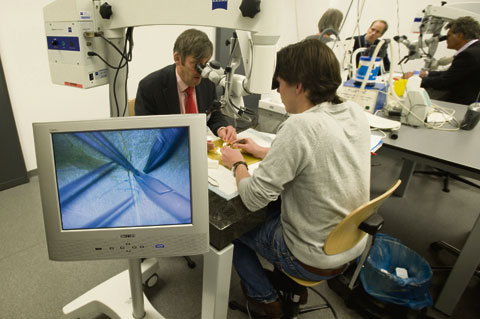With the tightening of rules regarding patients safety, surgeons have less opportunity to improve their skills on the job. How should they train then? That was the question debated during the Medical Delta Café.
“Nowadays, there is no way you can fiddle about with surgery,” says Dr Gert-Jan Kleinrensink. And while this statement may seem like
kicking in an open door, matters used to be much different in the past. According to the Dr Kleinrensink, and anatomy professor at the
Erasmus Medical Centre, in the old days surgeons had to perform operations that they had not yet fully mastered, simply because such operations were not commonly practiced. “In order to save lives, doctors just tried to perform it,” he says. “And people were also much more forgiving towards surgeons then.”
Those days are long gone.
Surgeons must now find different ways to practice. A straight forward method is through the use of training simulation systems. The question debated last Tuesday during a meeting organised by Medical Delta, a joint venture involving the universities of Leiden, Rotterdam and Delft, was how these training systems should be designed and implemented.
Six years ago Dr Kleinrensink set up a Skills laboratory in the Erasmus Medical Centre. The lab contains a Simendo, a virtual reality trainer for simulating laparoscopic surgery developed by Delft researchers, as well as a doll – named Stan – filled with sensors anaesthetists use to practice on.
Is it possible, a neurologist in the audience asked, to simulate complications with these training systems? “That’s exactly what we do with Stan,” Dr Kleinrensink replied. “The supervisors undermine the proceedings of the
anaesthetists. Sometimes the doll dies. You can’t imagine the impact that has on the anaesthetists. The supervisors have to offer post-
traumatic counselling.”
So the anaesthetists’ doll is realistic enough, to say the least, but for many other instruments, especially those used for laparoscopic (or key-hole) surgery trainings, this is not the case.
“How can we better simulate tissue? That is one of the things we must investigate further,” says Professor Jenny Dankelman of the department of biomechanical engineering (Mechanical, Maritime and Materials Engineering).
Another question raised is how to make the simulations visually more realistic and playful?
Medical Delta’s chairman, Ted Young, a professor in quantitative imaging (Applied Sciences), laughingly asks if there is someone from Playstation in the audience: “What we’re talking about here are games. It would be more interesting to have children play surgery games than shooting games.” Dankelman agrees: “That way you’d get more young people with good skills interested in surgery. My children for instance are great in playing the Simendo game.”
At the end of the day the audience is also allowed to play in the Skills lab. With trembling hands, they stitch ivy leaves. In another room people pile up little pieces of rubber with laparoscopic instruments while watching their clumsy manoeuvres on a video screen. The handles on these types of instruments are not very practical,” Dr Kleinrensink remarks. “The handles on Nintendo or Playstation are better.”
Aan de TU hebben 33 van de 38 masteropleidingen extra inschrijfmomenten. Koploper is echter Leiden: van de 88 masteropleidingen hebben er 85 extra inschrijfmomenten. Helemaal achteraan staat de Erasmus Universiteit, die zich er kennelijk minder mee bezig heeft gehouden. Slechts één van de dertig Rotterdamse masteropleidingen kent meer dan één instroommoment.
Dat blijkt uit een overzicht dat minister Plasterk de Tweede Kamer heeft gestuurd. Slechts vier universiteiten hebben voor meer dan de helft van hun masteropleidingen verschillende instroommomenten.
Verschillende instroommomenten zijn een ‘welbegrepen eigenbelang’ voor de universiteiten, vindt minister Plasterk. Als studenten straks niet meer aan hun masteropleiding mogen beginnen voordat ze hun bachelordiploma op zak hebben, is het verstandig om studenten niet alleen in september te laten starten, maar bijvoorbeeld ook in februari.
Om hieraan te werken, krijgt universiteitenvereniging VSNU de komende jaren subsidie om één voltijdsmedewerker aan te stellen. Die mag ervoor zorgen dat universiteiten van elkaar leren bij de invoering van meerdere instroommomenten per jaar.
Volgens de minister hoeven masteropleidingen alleen uitgezonderd te worden als ze erg klein zijn of een ‘heel sterke curriculaire opbouw’ hebben. Ook voor internationale masteropleidingen is het soms lastiger te regelen.



Comments are closed.